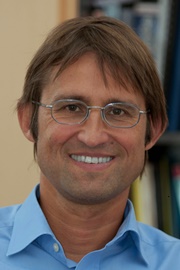

Georg Kresse

Born July 21, 1967 in Vienna, Austria
Professor for Computational Quantum Mechanics, University Vienna, Faculty of Physics, Sensengasse 8/12, A-1090 Vienna, Austria
Email:georg.kresse@univie.ac.at
WWW: external link
Sci.D Technical University of Vienna (1993), Erich Schmid Prize of the Austrian Academy of Science (1997), Ludwig Boltzmann Prize of the Austrian Physical Society (2001), Start Prize of the Austrian Science Foundation (2003), Full member of the Austrian Academy of Sciences (2011).
Author of:
more than 250 scientific papers.
Important Contributions:
- Development of the Vienna ab initio simulation package (VASP). The program package is widely used for the simulation of periodic and non-periodic condensed (solid or liquid) matter systems. VASP computes approximate solutions to the many-body Schrödinger equation, either within density functional theory (DFT), solving the Kohn-Sham equations, or within the Hartree-Fock (HF) approximation, solving the Roothaan equations. Hybrid functionals that mix the Hartree-Fock approach with density functional theory are available as well. Furthermore, Green's functions methods (GW quasiparticles, and ACFDT-RPA) and many-body perturbation theory (2nd-order Møller-Plesset) can be used.
- Development and application of quantum chemistry methods to solids. This includes simple perturbation theory such as Møller Plesset 2, as well as coupled cluster (CCSD, CCSD(T)) methods adopted to periodic systems. Application of full CI methods to the solid state.
- Development of approximate but accurate many body schemes for the solid state, including the random phase approximation and corrections mitigating the main deficiencies of the random phase approximation.
- Time dependent properties using TD-DFT (direct diagonalization as well as time evolution methods). Development of two particle Greens function based methods, such as the Bethe Salpeter and Parquet equation and adoption of these methods to solid and molecular systems.